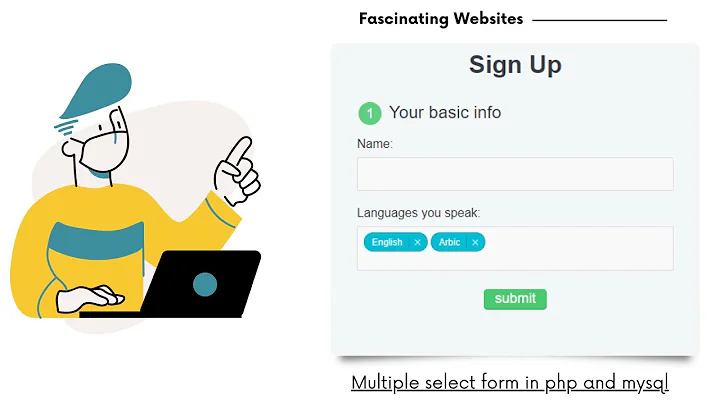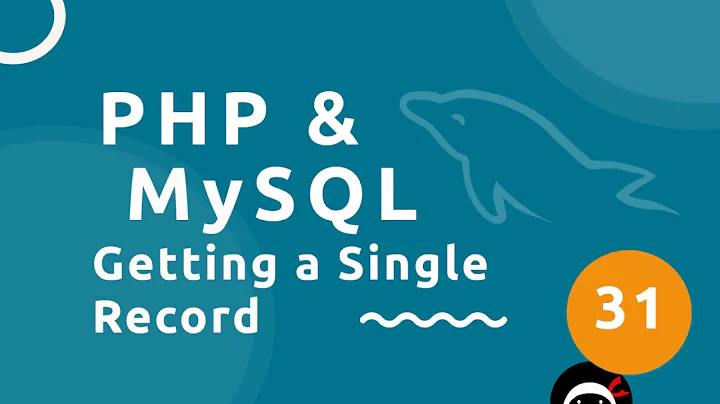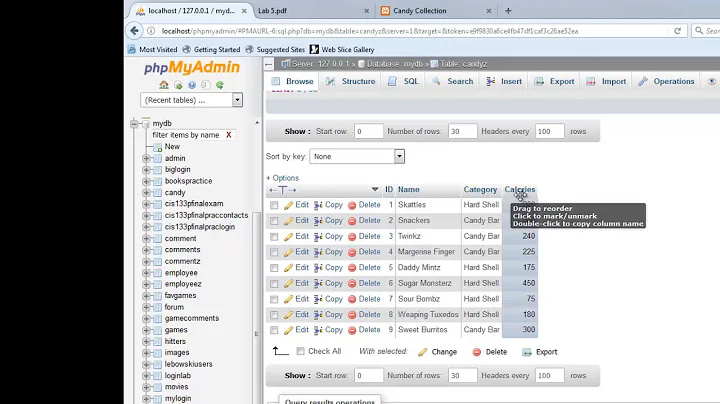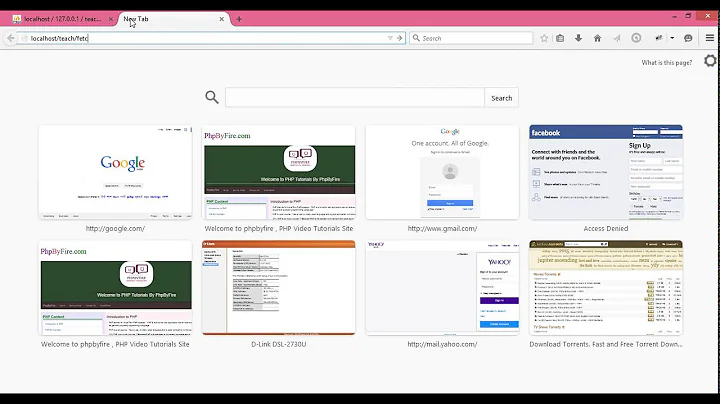PHP and MySQL Select a Single Value
Solution 1
Don't use quotation in a field name or table name inside the query.
After fetching an object you need to access object attributes/properties (in your case id) by attributes/properties name.
One note: please use mysqli_* or PDO since mysql_* deprecated. Here it is using mysqli:
session_start();
mysqli_report(MYSQLI_REPORT_ERROR | MYSQLI_REPORT_STRICT);
$link = new mysqli('localhost', 'username', 'password', 'db_name');
$link->set_charset('utf8mb4'); // always set the charset
$name = $_GET["username"];
$stmt = $link->prepare("SELECT id FROM Users WHERE username=? limit 1");
$stmt->bind_param('s', $name);
$stmt->execute();
$result = $stmt->get_result();
$value = $result->fetch_object();
$_SESSION['myid'] = $value->id;
Bonus tips: Use limit 1 for this type of scenario, it will save execution time :)
Solution 2
The mysql_* functions are deprecated and unsafe. The code in your question in vulnerable to injection attacks. It is highly recommended that you use the PDO extension instead, like so:
session_start();
$query = "SELECT 'id' FROM Users WHERE username = :name LIMIT 1";
$statement = $PDO->prepare($query);
$params = array(
'name' => $_GET["username"]
);
$statement->execute($params);
$user_data = $statement->fetch();
$_SESSION['myid'] = $user_data['id'];
Where $PDO is your PDO object variable. See https://www.php.net/pdo_mysql for more information about PHP and PDO.
For extra help:
Here's a jumpstart on how to connect to your database using PDO:
$database_username = "YOUR_USERNAME";
$database_password = "YOUR_PASSWORD";
$database_info = "mysql:host=localhost;dbname=YOUR_DATABASE_NAME";
try
{
$PDO = new PDO($database_info, $database_username, $database_password);
}
catch(PDOException $e)
{
// Handle error here
}
Solution 3
You do this by using mysqli_fetch_field method.
session_start();
$link = mysqli_connect("localhost", "my_user", "my_password", "world");
$name = $_GET["username"];
$sql = "SELECT 'id' FROM Users WHERE username='$name' limit 1";
$result = mysqli_query($link, $sql);
if ($result !== false) {
$value = mysqli_fetch_field($result);
$_SESSION['myid'] = $value;
}
Note: you can do that by using mysql_fetch_field() method as well, but it will be deprecated in php v5.5
Solution 4
mysql_* extension has been deprecated in 2013 and removed completely from PHP in 2018. You have two alternatives PDO or MySQLi.
PDO
The simpler option is PDO which has a neat helper function fetchColumn():
$stmt = $pdo->prepare("SELECT id FROM Users WHERE username=?");
$stmt->execute([ $_GET["username"] ]);
$value = $stmt->fetchColumn();
MySQLi
You can do the same with MySQLi, but it is more complicated:
$stmt = $mysqliConn->prepare('SELECT id FROM Users WHERE username=?');
$stmt->bind_param("s", $_GET["username"]);
$stmt->execute();
$data = $stmt->get_result()->fetch_assoc();
$value = $data ? $data['id'] : null;
fetch_assoc() could return NULL if there are no rows returned from the DB, which is why I check with ternary if there was any data returned.
Since PHP 8.1 you can also use fetch_column()
$stmt->execute();
$value = $stmt->get_result()->fetch_column();
Solution 5
Try this
$value = mysql_result($result, 0);
Related videos on Youtube
user3055501
Updated on July 20, 2022Comments
-
user3055501 almost 2 years
I'd like to know how to select a single value from my MySQL table. The table includes columns
usernameandidamongst others (idis auto-increment andusernameis unique). Given the username, I want to set a session variable$_SESSION['myid']equal to the value in theidcolumn that corresponds to the given username. Here's the code that I've already tried:session_start(); $name = $_GET["username"]; $sql = "SELECT 'id' FROM Users WHERE username='$name'"; $result = mysql_query($sql); $value = mysql_fetch_object($result); $_SESSION['myid'] = $value;So far I'm getting:
Catchable fatal error: Object of class stdClass could not be converted to string.
Casting
$valueto type string does not fix the problem.-
 Wes Cossick over 10 yearsJust a reminder... The mysql extension is deprecated and will be removed in the future: use mysqli or PDO instead
Wes Cossick over 10 yearsJust a reminder... The mysql extension is deprecated and will be removed in the future: use mysqli or PDO instead -
elixenide over 10 yearsThis has serious security problems. As @WesC points out, don't use the mysql_* functions. Also, you are wide open to SQL injection attacks.
-
-
user3055501 over 10 yearsThis worked in eliminating the error message, but printing
$_SESSION['myid']to the screen now displays "id" rather than a specific int. -
 Awlad Liton over 10 years@user3055501 : try above code. I have changed in $sql line and provide your feedback. It should work :)
Awlad Liton over 10 years@user3055501 : try above code. I have changed in $sql line and provide your feedback. It should work :) -
user3055501 over 10 yearsThanks for the answer Wes. I'll definitely look into PDO when I have more time.
-
 Wes Cossick over 10 yearsFrom personal experience, I recommend you look into it sooner rather than later. The more code you write using the
Wes Cossick over 10 yearsFrom personal experience, I recommend you look into it sooner rather than later. The more code you write using themysql_*functions, the more you'll find out that you'll be required to entirely rewrite. Plus, it's actually pretty convenient and more organized in other areas. -
Anders M. over 9 yearsin case someone else sees this and panics, you can change to mysqli instead which is better. note the i at the end of mysql
-
Gusstavv Gil over 7 yearsmysqli_fetch_field "Returns an object which contains field definition information or FALSE if no field information is available." so this won't work as suggested by the answer. -1 because of this.
-
ToolmakerSteve over 7 years@GusstavvGil: I've corrected the code by making sure there is a valid $result, before the call to
mysqli_fetch_field. I've also added the missing $link parameter. -
ToolmakerSteve over 7 yearsLike @AndersM said - I also find mysqli easier to use/read than PDO, for simple queries. Note however that Wes is making a very important point: if any part of your query includes text that is not 100% under your control, then use a prepared statement. In mysqli, that is
prepare, manual discussion of prepared statements -
 commonpike over 6 years@ToolmakerSteve mysqli_fetch_field does not return the value. It returns the field definition, like name, table, flags. -1 because of this... php.net/manual/en/mysqli-result.fetch-field.php
commonpike over 6 years@ToolmakerSteve mysqli_fetch_field does not return the value. It returns the field definition, like name, table, flags. -1 because of this... php.net/manual/en/mysqli-result.fetch-field.php -
Brian Fleming almost 6 yearsNeeds a ; on the fifth line.
-
 mickmackusa over 4 years...and never use raw user input in your query.
mickmackusa over 4 years...and never use raw user input in your query. -
 mickmackusa over 4 yearsThis answer should not be used because it is insecure/unstable.
mickmackusa over 4 yearsThis answer should not be used because it is insecure/unstable. -
 mickmackusa over 4 yearsstackoverflow.com/questions/59893254/… (it is surprisingly hard to find secure queries to close new questions with.)
mickmackusa over 4 yearsstackoverflow.com/questions/59893254/… (it is surprisingly hard to find secure queries to close new questions with.) -
 Dharman about 4 yearsWarning:
Dharman about 4 yearsWarning:mysql_*extension is deprecated as of PHP 5.5.0, and has been removed as of PHP 7.0.0. Instead, either the mysqli or PDO_MySQL extension should be used. See also the MySQL API Overview for further help while choosing a MySQL API. -
 Dharman about 4 yearsWarning:
Dharman about 4 yearsWarning:mysql_*extension is deprecated as of PHP 5.5.0, and has been removed as of PHP 7.0.0. Instead, either the mysqli or PDO_MySQL extension should be used. See also the MySQL API Overview for further help while choosing a MySQL API. -
 Dharman about 4 yearsWarning: This answer is totally wrong.
Dharman about 4 yearsWarning: This answer is totally wrong.mysql_fetch_field()returns metadata about a table column, not the value itself. -
 Dharman about 4 yearsWarning: This answer is totally wrong.
Dharman about 4 yearsWarning: This answer is totally wrong.mysqli_fetch_field()returns metadata about a table column, not the value itself. -
 Dharman about 4 yearsWarning:
Dharman about 4 yearsWarning:mysql_*extension is deprecated as of PHP 5.5.0, and has been removed as of PHP 7.0.0. Instead, either the mysqli or PDO_MySQL extension should be used. See also the MySQL API Overview for further help while choosing a MySQL API. -
 mickmackusa about 4 years"Try this" answers are low-value on Stackoverflow because they do a poor job of educating/empowering the OP and thousands of future researchers. Even if you feel your solution is ultra-basic/self-explanatory, ALL answers should include some form of plain English supporting text. Tell researchers how it works, why it works, how it is different from other answers, why you think it is a good idea, provide link(s) to documentation, etc. Simply be generous when you answer with the intent to help people and role model good answer posting behaviour to others.
mickmackusa about 4 years"Try this" answers are low-value on Stackoverflow because they do a poor job of educating/empowering the OP and thousands of future researchers. Even if you feel your solution is ultra-basic/self-explanatory, ALL answers should include some form of plain English supporting text. Tell researchers how it works, why it works, how it is different from other answers, why you think it is a good idea, provide link(s) to documentation, etc. Simply be generous when you answer with the intent to help people and role model good answer posting behaviour to others.








